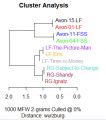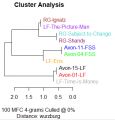Spotlight on stylometric text analysis: Difference between revisions
m (→RStudio) |
|||
| Line 64: | Line 64: | ||
Image:RStudio-Short-02.jpg|''MFC 4-gram'' | Image:RStudio-Short-02.jpg|''MFC 4-gram'' | ||
</gallery> | </gallery> | ||
==A Short story, an one act drama and four Sunday stories== | |||
===Analysis=== | |||
[[Category: Spotlight on|Stylometry]] | [[Category: Spotlight on|Stylometry]] | ||
Revision as of 19:42, 20 September 2020
Different authors have different writing styles. Like the lenght of words and sentence, the frequencies of word, the frequencies of word forms, the richness of vocabulary, the use of punctuation and on. The author can also have preferences for certain spelling variants or using certain expressions.
Stylometry is the study of measurable features of style.
The Story of the Phantom
The Story of the Phantom is a series of 15 novels, published by Avon Publications in the U.S. from 1972 to 1975, based on Lee Falk's Phantom stories.
| Adapted by | issues | note |
|---|---|---|
| Basil Copper | 2, 3 | #2 The adaptor is not credited |
| Carson Bingham | 14 | |
| Frank S. Shawn | 4, 5, 7, 8, 10, 11 | #10 The adaptor is not credited |
| Lee Falk | 1, 6, 9, 12, 15 | #15 is wrongly credited as Carson Bingham |
| Warren Shanahan | 13 |
When released the adaptor of issues 2 and 10 was not credited, and issue 15 was credited as Carson Bingham. Lee Falk did correct this using an "Author's note"' in the books.
Analysis
Stylometric analysis to see if Lee Falk's correction in the "Author's note" can been confirmed.
- JGAAP = Java Graphical Authorship Attribution Program
- MFW - most frequent words
- MFC - most frequent characters
- n-Grams - Sample for character 2-grams: The Phantom said = th,he,e , p,ph,ha,an,nt, etc. Sample for word 2-grams: Hello, the Phantom said = hello the,the phantom,phantom said, etc.
- Corpus - collection of text. Here the 15 novels, from chapter 1 to the end of the novel.
JGAAP
The novels were prepared adding the novels to each of the authors, leaving issues 2, 10 and 15 as unknown authors. Using character 4-grams with nearest neighbor driver with metric Cosine Distance, issues 2, 10 and 15 were compared to the known authors.
The result were that the most likly author for: #2 is Basil Cooper, #10 is Frank S Shawn and #15 is Lee Falk.
RStudio
The novels were put into one corpus folder. Two analysis were done: first 100-1000 MFW 2-gram and the second 100-1000 MFC 4-grams. Both using the Boostrap Consensus Tree.
The result grouping the novels according to the table above, confirming Lee Falk's correction in the "Author's note".
Interesting the analysis grouping issues 13 and 14 with statistic similar style.
Short stories and an one act drama
Analysis
In this analysis the corpus consists of 5 texts by Lee Falk: two short stories: "The Picture Man" (1937) and "Time is Money" (1975), an one act drama: Eris (1966), and two of the Phantom novels: issue 1 (1972) and issue 15 (1975). In addition 5 texts by Ron Goulart: three short stories: "Shandy" (1958), "Ignatz" (1960) and "Subject to Change" (1960) and two Phantom novels (pen name Frank S. Shawn in this series) issue 4 (1973) and issue 11 (1974).
The corpus is is a mix of different genres: 4 novels with the Phantom as the main character, 4 science fiction short stories, one mystery /science fiction short story and one drama.
RStudio
The text were put into one corpus folder. Two analysis were done: first 100-1000 MFW 2-gram and the second 100-1000 MFC 4-grams. Both Cluster Analysis using Cosine delta.
The MFW analysis group the shorter texts in relation to the respective authors. As for the novels, these are grouped correctly in relation to the authors, but independently of the shorter texts. This may be due to different lengths of the texts or that the novels are within the Phantom genre style.
The MFC analysis group Ron Goulart's short stories and novels correctly, but wrongly include both the "Eris" and "The Picture Man" by Lee Falk. Interesting Lee Falk's short story "Time is Money" is listed with his two Phantom novels.



